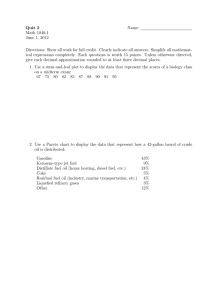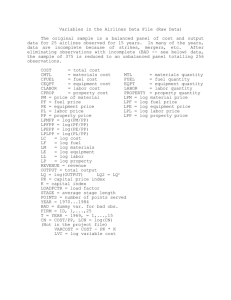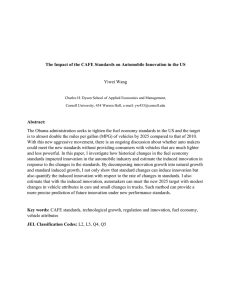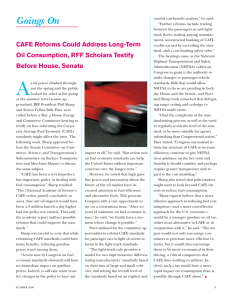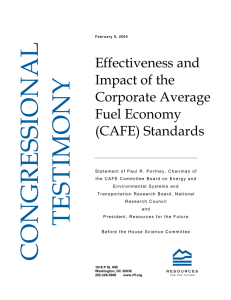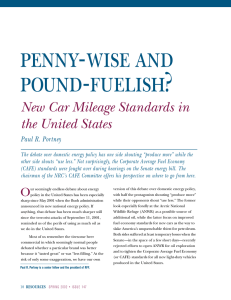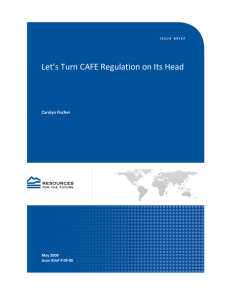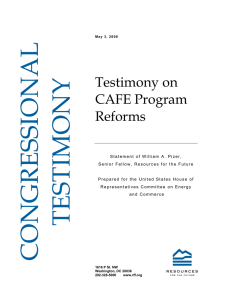Consumer Responses to Fuel Economy Christopher R. Knittel
advertisement
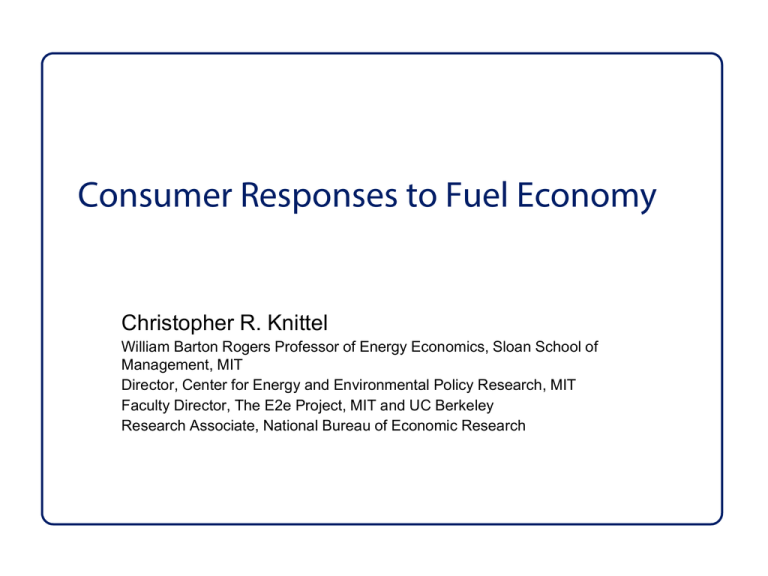
Consumer Responses to Fuel Economy Christopher R. Knittel William Barton Rogers Professor of Energy Economics, Sloan School of Management, MIT Director, Center for Energy and Environmental Policy Research, MIT Faculty Director, The E2e Project, MIT and UC Berkeley Research Associate, National Bureau of Economic Research How do consumers value fuel economy? • • By how much consumers value fuel economy one of the most important policy issues related to CAFE 80% of the benefits of CAFE are predicated on the assumption that consumers undervalue fuel economy (or firms believe they do) • • Why? If consumers correctly value fuel economy either (a) CAFE standards wouldn’t be needed to incentivize the new technology, or (b) NHTSA would be adding the net benefits up incorrectly Existing empirical literature • Three recent papers in economics suggest consumer mistakes don’t exist or are small • • • Busse, Knittel, and Zettelmeyer (American Economic Review, 2013) • • New car DR: 0.0 – 6.7 percent Used car DR: 0.1 – 11.8 percent Allcott and Wozny (Review of Economics and Statistics, 2014) • Used car DR: 15 percent Sallee and West (Journal of Public Economics, forthcoming) • Used car DR: 5.0 percent What should their discount rate be? • The right discount rate is the marginal cost of funds faced by consumers From a panel of ~4000 HHs. Conditional on having CC debt (~60-70% of US) High income, high credit score Densities for new- and used-auto loans On-going research • • • Randomized Control Trial with Hunt Allcott • Partnering with Ford Motor Company Placed research assistants in seven Ford dealerships across the country Designed an iPad App that is a short (personalized) course on the importance of fuel economy • Currently collecting data on vehicle purchases • Also running an online experiment Fuel economy short course Fuel economy short course Personalized information PRELIMINARY results • • We are still collecting data Have data for roughly 25 percent of participants • Draw no conclusions from this! • (Other than, “I can’t wait until they are done”) Did the information change beliefs? • Did people learn from the experiment? • "Was this information surprising? Gasoline costs are:” • • • • Same as I thought: 43.3% More than I thought: 38.4% Less than I thought: 4.7% Hadn't thought about gas prices until today: 13.6% Is fuel economy more important? (0-10 scale) Fuel Cost Importance 8 Difference: 0.12 95% CI: [-0.37, 0.62] 7 6 5 4 3 2 1 0 Treat Control Difference Did it translate into higher MPG? Combined MPG 30 Difference: 0.69 95% CI: [-1.35, 2.72] 25 20 In logs: 95% CI: [-0.06, 0.09] 15 10 5 0 Treat Control Difference Did it translate into higher quality? Price Paid 35000 Difference: $1,898 95% CI: [-570, 4,366] 30000 25000 In logs: 95% CI: [0.015, 0.34] 20000 15000 10000 5000 0 Treat Control Difference Conclusions? • Recent research suggests that consumers are not undervaluing fuel economy • • • CAFE hinges on undervaluation More research is certainly needed • • Given importance of issue Given conventional wisdom among policy makers That’s the goal of our new work • Still in the midst, so stay tuned!
